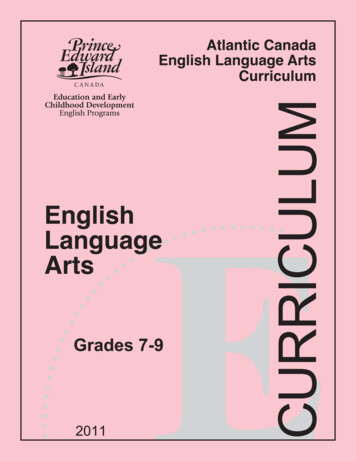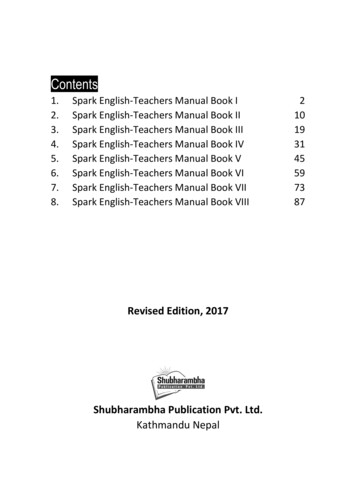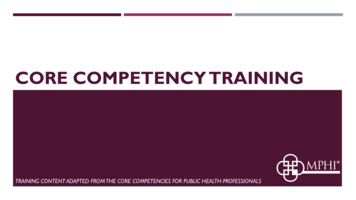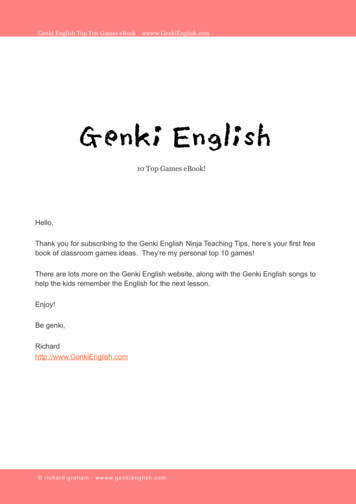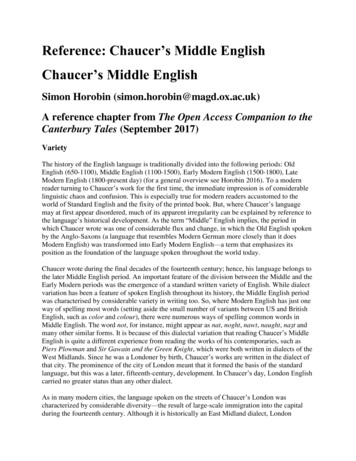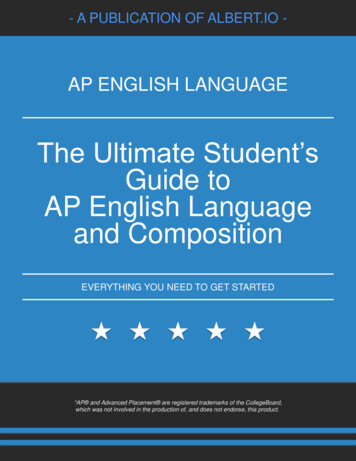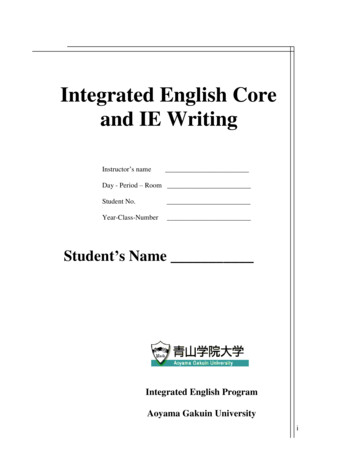
Transcription
Integrated English Coreand IE WritingInstructor’s nameDay - Period – RoomStudent No.Year-Class-NumberStudent’s NameIntegrated English ProgramAoyama Gakuin Universityi
Integrated English CoreProgram Organization .Task 1: Journals .Task 2: Discussions on Newspaper Articles .Newspaper Article Summary.Discussions at the Chat Room . .Task 3: Reading: Extensive Reading, Analyzing Novels and Tests .Literary Terms .Book Report Form .Rating Book Reports .Task 4A: Presentations .Task 4B-C: Poster Sessions and Projects .Vocabulary Lists, Grammar, and IE Themes .24691316183235525662Integrated English WritingIE Writing Objectives .The Writing Process – Brainstorming .Passive and Active Voice and Third Person .Conjunctions and Punctuation . .Combining Short Sentences, Transitions & Coherence . .Marking Symbols .IE I: Model Paragraphs and Samples .Peer Editing, a Checklist, and a 10-pt Rubric .IE II: Paragraph to Essay: Diagram .IE II & III Model Essay.Creating Thesis Statements .IE II Model Analysis Essays .IE II Comparison-contrast Essays .10-pt Rubric and a Checklist .References in Essays and the APA Style .Paraphrasing, Summarizing, and Direct/Indirect Quotations .IE II & III Essays and Quotations. .12-pt Rubric for Scoring IE Essays . . .UPLOAD WRITING ASSIGNMENTS . 3i
PLAGIARISM AND THE IE PROGRAMPlagiarism occurs when you take another person’s ideas or words without properly acknowledgingthem. If you take information from other sources (such as books, academic journals, podcasts, or Webpages), you must cite these sources properly. Of course, copying another student’s work is plagiarism,too. In the IE Program, you will learn how to make citations, and it is your responsibility to avoid allplagiarism.When is it necessary to cite sources?In some cases, for example, in journal writing or when expressing personal opinions, yourwriting may be based on your own experiences and make use of your personal background andcommon knowledge. In such cases, you don’t need to cite sources because YOU are the source.However, most academic writing requires the use of material from other sources and you mustnote the information and its source.Submitting an assignment with even one part taken from another source is plagiarism unless youcite the source properly. You may quote directly from a source with proper citation, but it isbetter to paraphrase or summarize information in your own words rather than just copy part of it.But even when you paraphrase or summarize information, you still must cite the original source.Be careful if the statement, “Free use is allowed” appears on a Web page. Use of any materialwithout citing the source is plagiarism.What is the IE Program Plagiarism Policy?Plagiarism of any assignment in any IE course – including Academic Writing and AcademicSkills – will lead to failure on that assignment, without the option to rewrite. If a studentplagiarizes on a second assignment, s/he will fail the entire course. IE Program teachers are veryexperienced at identifying plagiarism, and all cases must be reported. In addition, a database isbeing created of all IE assignments that students turn in. This will identify any reports, essays, orother assignments if another student copies any of this work and tries to hand it in.What are other consequences of plagiarism?Being caught plagiarizing can have a negative effect on your reputation. In some cases, thereare legal and financial consequences. For example, an author may sue someone who plagiarizeshis/her work.Benefits of original, plagiarism-free workHere are some ways that you and your classmates can benefit from avoiding plagiarism:* Your English skills will develop more rapidly.* You will be able to express your own ideas and opinions.* You will be able to communicate better with others.* You can take pride in your accomplishments.* Students will not feel pressured or bullied by classmates who want to copy their work.* You will help preserve the reputation for excellence in English that AGU and the EnglishDepartment have built over many years and you will help other English majors in job-hunting.i
IE COREThe IE Core and IE Writing sections were developed by Gregory Strong with contributions from Joseph Dias and members of past IECommittees including professors Erica Aso, Keiko Fukuda, Matsuo Kimura, Mariko Kotani, Wayne Pounds, Peter Robinson, HirokoSano, Donald Smith, Minako Tani, Jennifer Whittle, Teruo Yokotani, Hiroshi Yoshiba, and Michiko Yoshida; with former IECoordinator, James Ellis; IE Core, Listening, and Writing teachers, including Tom Anderson, Melvin Andrade, Mike Bettridge, DeborahBollinger, Loren Bundt, Vivien Cohen, Ida Gomez, Kazuyo Hoshizaki, Kazuko Namba, John Pulaski, Joyce Taniguchi, Todd Rucynsky,Masumi Timson, Yoko Wakui, and Jeanne Wolf who provided activities, and some student examples, and graduate student, Mirei Hirotawho typed them. Later, Erina Iwai helped update the new APA references. Work on the program began in 1993 with the support of theEnglish Department, particularly, past chair persons Minoji Akimoto, Osamu Nemoto, Tsutomo Makino, and Kyosuke Tezuka.Copyright, March 4, 2018Gregory Strong, Aoyama Gakuin Universityii
IE CORE AND WRITING GUIDEPROGRAM ORGANIZATIONThe IEP (Integrated English Program) has three sections: IE Core, IE Active Listening, and IEWriting. In IE Core, you will be working on combined skills. In the IE Active Listening section,you will watch interviews, documentaries; do online listening, and practice your skills through aweb-based self-access program. The focus of the IE Writing section is on academic writing:paragraphs and essays. You will use brainstorming, peer tutoring, and revising.CoreTASK 1: journal writingTASK 2: news discussionsreading skillsTASK 3: extensive readingand book reportsIE LEVEL IThemes:Memories/ Pop CultureUrban LifeFood and HealthTravel/ Differing Cultural ValuesWritinglearning paragraph structure:topic sentence, examples,transitionsparagraph types:- classification- comparison/contrast- persuasiveActive Listening- basic listening skills- interactions in small groups- group presentations- listening reports- self accessAfter completing the IE Program, you will take Academic Writing and Academic Skills courses,and you may be eligible for an IE Seminar in such areas as Art History, Cross-culturalCommunication, Film and Culture, Popular Music, Mythology, and Teaching English as aForeign Language.2
IE CORE AND WRITING GUIDEPLACEMENT AND GRADINGInitially, we test your language ability by a TOEFL test and place you in an IE I, IE II or IE IIIclass matched to your ability. Our IE classes are small so that you will have every chance to takepart in classroom activities and to interact with your teacher. The teachers of your IE Core,Writing, and Listening sections combine your scores into a total grade for IE at the end of theterm. Attendance and class participation are important in each section. Your Writing andListening sections each count for 30% and the IE Core for the remaining 40% of your totalgrade. To pass each level of IE, the overall, calculated grade for the three sections must be 60%or higher. You must pass each individual course by at least 50%.CoreTASK 1: journal writingTASK 2: news discussionsreading skillsTASK 3: extensive reading,book reportsTASK 4A/4B: presentation orposter sessionIE LEVEL 2Themes:Changing Times\TechnologyThe WorkplaceGeographyBiographyWritingintroduction to the essay:thesis writing, topic sentence,examples, transitions- comparison/contrast essay- analysis essayActive Listening- listening to interviews,and documentaries,- interactions in small groups- listening reports- self access listening3
IE CORE AND WRITING GUIDECoreTASK 1: journal writingTASK 2: newspaper discussionsreading skillsTASK 3: book reportsTASK 4A\B: presentations,survey or interview projectsIE LEVEL 3Themes:Relationships\PsychologyCross-cultural valuesThe environmentThe mediaWriting- review the essay form- quoting and paraphrasing- using the APAAPA Style whenciting references- creating a bibliography- classification essay- persuasive essayActive Listening- basic listening skills- interactions in small groups- group listening presentations- listening reports- self accessI. JOURNALSIn your IE Core classes, you will keep a journal, or contribute to a class blog. These types ofwriting help you to use English communicatively and improve your abilities to describe yourfeelings, tell about your experiences, and express your ideas. Your teacher may assign you a“secret friend” or penpal with whom you will exchange journals. Using “pen names” can makeyour exchanges more exciting. Generally, you need to write 3 double-spaced pages each week(or 1.5 single-spaced pages). Making regular entries in your journals or blogs is an important partof your IE Core grade.I.(a) TOPICS FOR YOUR JOURNALDon’t just write about your club activities (narrative writing). Look carefully at the topics on thenext 2 pages and try something new. Take the challenge of writing in a different “genre.” Trymaking an argument. Review a book, a movie, a TV show, or make a prediction.4
IE CORE AND WRITING GUIDEEXPOSITORY or EXPLANATORY ompare your life now with the future, Japan today with the past or with Japanof tomorrow.Compare Japan with the UK/China/the U.S./Australia/CanadaDescribe your future – your career, or your family.Describe the ways in which books/films/travel can change your life.Describe the differences between men and women, children, and teenagers; peopleand animals, animals and plants.Describe an important person from your childhood, an unusual person, your favoriteteacher, one of your classes, or a particular lecture.Describe your hometown or some other place in Japan or the world.Describe a sport you play, a musical instrument, a hobby, or your heroesDescribe a friend, family member, or a pet.Describe a new invention that would solve a problem or make life better.How you would solve a social or economic problem such as domestic violence,juvenile crime, homelessness, unemployment, Japan’s slow economic growth?How would you reduce Japan’s dependency on nuclear energy?How you would change your old high school if you were the principal.How would you compare university life to your life in high school, Japan withanother country, two types of music, or two types of people?Young people in Japan have different values than their parents.The three people in your life (besides your parents) that have had the biggestinfluence on you.What is your philosophy of Life?PERSUASIVE WRITING1.2.3.4.5.6.7.8.9.10.11.TV is/is not a waste of time.Couples should/ should not live together before getting married.Japan should/should not have nuclear energy.Macintosh computers are/ are not better than IBMs.Abortion should be/ should not be illegal in Japan.University entrance exams are/ are not unfair.Capital punishment should be/ should not be abolished in Japan.The government should do/ should not do more to promote women’s rights.Ghosts exist/do not exist.Aliens have/ have not visited earth in UFOs.Travel is the best/worst education.5
IE CORE AND WRITING GUIDENARRATION or NARRATIVE WRITING1.2.3.4.5.6.7.Tell of an event in your childhood, for example, a best or worst memory.Tell a ghost story, a legend, or historic incident.Tell a story from your childhood, your dreams, or yours fears.Tell the story of a modern or historical character.Write about a recent trip.Write about the events in a book, film, or television program.Write about a dream you recall.II. DISCUSSIONS ON NEWSPAPER ARTICLESYou will learn how to participate in a discussion in IE I. The same skills are used in IE II and IEIII, with more complex tasks, based on paraphrasing and summarizing longer news articles.In each course, you will be asked to be a “discussion leader” about three times. Theother times in class, you will be participating in discussions. If you are a group leader, you willneed to use your partners’ names when speaking to them, make eye contact, and use gestures. Inaddition, you’ll learn phrases for asking your partners’ opinions, turn-taking while discussingtopics, ways of agreeing and disagreeing, and how to ask for clarification and make additionalpoints.II.(a) INTERRUPTING, ASKING FOR CLARIFICATIONThere are many ways to practice these skills. One is a game where you interrupt and ask for clarification:1. The teacher or a student volunteer starts talking on any subject.2. Anyone in the class can interrupt and disagree with the speaker or ask for clarification if they use the rightexpressions.3. The speaker quickly answers the person who interrupted or provides clarification and resumes talking aboutthe subject.4. Everyone else tries to interrupt or ask for clarification as often as possible and in as many ways to sidetrackthe speaker.6
IE CORE AND WRITING GUIDEII.(b) GIVING A REASONAnother way is to practice adding reasons:1. Write down the names of different jobs on pieces of paper. Then fold the papers so that what’s written onthem can’t be seen.2. A group member draws a paper and imagines that it describes the job of the student sitting on the right.(S)he expresses why the job is a suitable one for that person. For example, “I think you would be a greatsinger because ”3. The first group member passes the paper to the left and that person adds a different reason: “Furthermore.”4. After the paper has gone around the group, another person draws a new paper and the game continues.ASKING OPINIONSAGREEING- Could you tell me youropinion?- How do you feel about it?- I’d like to ask. ?- I’d like to know. ?- I’m interested in. ?- What do you think?- What’s your opinion?- What’s your idea?- What do you have to say?-Certainly, that’s true.I agree.I have the same opinion.I feel the same way.Likewise (for me).Me too/ So do I.Yes, that’s what I think.I couldn’t agree moreDISAGREEING-I can’t agree.I can’t believe that.I disagree.I don’t think so.I have a different opinion.I have another idea.I feel differently.I’m not sure I agreeI partially agreeII.(c) ROUND ROBINIn this exercise, a proposition or an idea goes around the circle or small group. Students eitheragree or disagree and offer a reason. The propositions can be outrageous ones.a) The world is really flat.b) Santa Claus is a real person.c) There is a rabbit making mochi on the moon.d) The number four is unlucky.e) Your blood type determines your personality.f) Lines on the skin of the palm of your hand indicate your future, including your marriage andyour lifelineg) Kappa, a type of Japanese fairy can be found in Tokyo.h) If you step on a crack in the sidewalk, you will break your back.i) If a black cat walks in front of you, you will have bad luck.7
IE CORE AND WRITING GUIDEINTERRUPTINGCLARIFICATIONGIVING REASONSExcuse me for interrupting, but.I might add that I’d like to say something.May I say something.Pardon me, but Sorry, but.Wait a minute! / Just a moment!Just a minuteI beg your pardon.I didn’t catch the last part.I didn’t get that.Sorry, I don’t follow you.What was that?Will you please explain Would you mind repeating that?And another thing.Because.Furthermore.Next Now, I’ll move to/go toSeeing as how.The main reason is.That’s why.(This is)the reason why.II.(d) CHECKLIST FOR IE I, II, III DISCUSSIONSYour checklist for student discussions has 3 parts: explaining, questioning, and communicatingnon-verbally. You will watch a DVD describing the parts of a discussion and of studentsleading discussions. Observe their discussion skills and discuss your observations with yourteacher and classmates. This task will help you to learn what to do when you become adiscussion leader.Items on the ChecklistA. Explaininga) describes the content thoroughly (without excessive reading from notes)b) summarizes partners’ comments after each questionB. Questioningc) asks partners a variety of questionsd) uses follow-up questions when necessaryC. Communicating Non-verballye) makes frequent eye contact with partnersf) uses gestures frequently (e.g., pointing to a photograph or headline)ExplainingQuestioninga) describingc) asking questionsb) summarizingd) using follow-upquestions8Communicating Nonverballye) making eye contactf) using gestures
IE CORE AND WRITING GUIDETeacher’s Rolei. As part of teaching the role of discussion leader, the teacher will:1) explain the checklist and describe the qualities of a “successful” discussion,2) use the checklist with you to evaluate your discussions,3) videotape discussion groups periodically and show you the tapes for class discussion andpeer/self-evaluation.ii. The Teacher as Discussion Facilitator/ CheerleaderIn addition to pre-teaching the use of questions and strategies for follow-up questioning, yourteacher will circulate among the discussion groups, offering encouragement. During discussions,the teacher may:1) model language to correct your mistakes,2) recast phrases verbally when a student errs in pronunciation or in grammar,3) encourage students to make thoughtful contributions to the discussion,4) allow for 3 or 4 repetitions, in a different group each time, so that discussion leaders candescribe their content more than once, reading less from their notes with each repetition5) ask you to “shadow” your discussion leader which means paraphrasing whathe or she has just said.II.(e) NEWSPAPER ARTICLE SUMMARYIn IE Core classes, you are supposed to summarize an English newspaper article for yourdiscussion. With your summary, you should also hand in a copy of the article. You mustsummarize it, not copy it. This important skill will be used later in Academic Writing. Here arethe steps to follow:1. Find articles from online news sources like CNN (http://cnn.com) and the BBC(http://bbc.co.uk), or from printed newspapers and magazines which you’ll find in the library,such as The Japan Times. You can also find some of the articles from those newspapers, andothers, online at http://www.asahi-net.or.jp/ gj7h-andr/index.files/news english online2.htm http://www.cl.aoyama.ac.jp/ dias/EsllinksNewspapers.html 2. Print out the article, or photocopy it, and staple it to your summary.3. Note the source of information as completely as possible (writer, title of the article, nameof the newspaper or magazine, and date) according to APA Style:e.g., Park, A. (2009, February 9). The Quest Resumes. Time, p. 30.9
IE CORE AND WRITING GUIDEIf you use an online newspaper article, you must note the url, too:e.g., Barrowclough, A. (2009, April 12). Man Survives 180 Foot Plunge Over NiagaraFalls. The Times Online.Note that you capitalize the first letter of all the nouns and verbs in the title. Also, if the url ofthe article is too long, then you break it into parts before and after the slash mark /.4. In point form, note the following key information:Who?What?Where?When?Why?How?5. Prepare a summary of the article by answering the W/H questions.6. Choose 5 vocabulary words that are important in the story. Then write down a definition ofeach of them and a sample sentence. Then teach the words to other students.7. Write down your opinion (“I thought that.” or “I felt that.”).8. Finally, you should prepare three questions for your group discussion.Useful Expressions for Talking about Articles and for Teaching VocabularyThe topic of my news story is My news story is about Do you know the word ?Have you ever read/heard of the word ?Do you know what means?Are you familiar with the word ?The first/second/third/fourth/fifth word in my vocabulary list is is a noun. It is a person who .is a verb which means .The adjective, that describes .is like/ similar to Jenny and it means .10
IE CORE AND WRITING GUIDEExample 1: Tomomi Tsunoyama, IE III CorePassengers the Real Heroes: Bus DriverJuly 14th, 2008action of the police.A 62-year-old bus driver attacked by twoyouths on Thursday says his buspassengers were the heroes."My special hero is a lady named Amber whonot only rang the police on her mobile phone,she also took photos of the incident and wasable to give the police very good descriptionsof the offenders.David Newton wrote a letter to The Bulletinyesterday, reassuring family and friends hewas OK after being punched in the headoutside Australia Fair about 1.20pm."A passenger advised me that youths werespraying graffiti on the bus using spray cansand special marker pens," he said. "I caughtthem in the act and advised them that I wascalling the police."These youths then tried to escape from thebus without success, as I was assisted by apassenger. They then turned violent on me."But after I defended myself and with theassistance of another Surfside driver, theygave up."Mr Newton said three youths then escapedthrough the rear skylight hatch of the bus."Many people have contacted my family,work and talk back radio about the incident,and I wish to advise them all that I onlyreceived minor injuries in the incident," hesaid."I wish to thank a New Zealand tourist, JimMcDougall, who assisted me in preventing theyouths from escaping as well as the prompt"I have since contacted her and she and mywife are going out for a celebration drink fora successful outcome in catching theseoffenders."The good news is that a mobile telephonewas found in the skylight."On investigation, the police were able totrack the owner."The phone supplied plenty of photos ofother graffiti incidents that the youths haveperformed."A lot of people have asked me whether thisincident would put me off bus driving."My answer is no, because I am not going tolet an incident like this upset me. More than99.9 per cent of our passengers are a pleasureto deal with."Three of the youths involved in Thursday'sincident are helping police with theirinvestigations. Police are still looking for twoof the teenagers.11
IE CORE AND WRITING GUIDE[Errors of grammar and word choice have not been corrected.]14 July 2008Source of the Article:Passengers the Real Heroes: Bus Driver. (2008, July 14). The Gold Coast Bulletin. Retrieved /13642 gold-coast-news.html.Who? ----- David NewtonWhat? ----- was punchedWhen? ---- Monday 14 July 2008Where? ----Australia Fair, SouthportWhy? ----- Telling off youths making graffiti in the busHow? ----- A passenger told him that there were youths vandalizing the busVocabularyAttacked –trying to harm someone or somethingGraffiti – paint or writing on something that spoils its appearanceAdvised - gave someone some advice or informationViolent - injurious or destructive forceHatch - an opening that serves as a doorway or window in the floor or roof of a building.Summary:A 62-year-old bus driver named David Newton was attacked after telling off youths about spray paintinggraffiti on the bus. While getting off the bus, a passenger informed Newton that there were youths in the backof the bus, spray cans and special marker pens, spraying graffiti. Newton caught the youths in the act andadvised them that he was going to call the police. The three youths tried to escape from the bus, but anotherpassenger stopped their escape, and the youths became violent. Then some of the youths escaped through therear skylight hatch of the bus.My opinion:Graffiti is a big problem within Japan right now as it was discovered that a group of university students have“tagged” one of the world heritage buildings in Italy. Later it was also discovered that a baseball coach of afamous high school had also vandalized a world heritage place. I don’t understand why people would vandalizesuch famous buildings. It is disrespectful to the people who built such monument. Another recent case ofvandalism in Japan is the case where a bullet train was vandalized and had the word ‘Hack’ spray painted on. Itis believed that the artist sneaked in from the gap in the fence and had around 20-30 mins to graffiti. Thesepeople should be made to clean the graffiti, as a punishment, as well.Questions:1. How do you feel about the rise in vandalism?2. What do you think would be a fair punishment for the people who vandalized?3.12Why do you think young people vandalize objects?
IE CORE AND WRITING GUIDEII.(f) RATING SCALE FOR IE III DISCUSSIONSAlthough the checklist in Section II.(d) will be used at all three levels, your skills should behigher at each level. The following Teacher Rating Scale rates these skills.Explaining3210Questioninga) Communicated the ideas inthe article without readinga) Summarized your partners’comments after each questionb) Explained vocabulary whennecessary, using only Englishb) Used follow-up questions andrephrased questions asneededc) Spoke clearly and loudlyenough to be easily understoodAny combination of 2descriptors*Any 1 descriptor*Read the article aloud3Non-verballyCommunicatinga) Frequent eye contactb) Appropriate and helpfulgestures3c) Directed the group by usingnames, to get others to speak210Any combination of 2descriptors*Any 1 descriptor*Read the questions210c) Good posture and sensitivity toothers’ nonverbalcommunicationAny combination of 2descriptors*Any 1 descriptor*No eye contact or gesturesIII. DISCUSSIONS AT THE CHATROOMThe Aoyama Gakuin Chat room is a place where you can practice speaking English with youngpeople from around the world on Mondays to Fridays, 11AM – 5PM. To join a 40-minutesession, you need to make a reservation on the student portal. But you should avoid trying toreserve at lunch time as the Chatroom is almost always full.13
IE CORE AND WRITING GUIDEFind the link on the website of the student portal, then make a reservation to join a chat.You can watch videos about the Chat Room on You Tube.com:https://www.youtube.com/watch?v 0YkFBMy26M0https://www.youtube.com/watch?v FEj6p8jDOs8When you attend a Chat Room session, you can get a stamped card showing that you were there.14
IE CORE AND WRITING GUIDE15
IE CORE AND WRITING GUIDEThe Chatroom also has several special events each years, including a Halloween party, and aChristmas party.IV. READING: EXTENSIVE READING, ANDANALYZING 2 NOVELSOne of the most effective ways to improve your reading is by reading fluently and quickly. Thistype of reading is called “extensive reading,” or ER and the approach is for you to read as muchas you can in English. Much research has been done on this technique of learning a language.Scientists have found that students reading 200,000 words in a year may have improvements intheir vocabulary, reading speed, reading comprehension, knowledge of English sentencesstructure and even in their writing.All IE Core I and II students have been asked to buy an access card to xreading so that they canborrow books from a digital library of more than 600 books and after installing a free app, readthese on their keitai, a tablet, or a home desktop computer. Of course, you may also go into one16
IE CORE AND WRITING GUIDEof the computer rooms in Building 15 and log into a computer there during lunchtime or afterschool. This reading on your telephone will not affect your data-plan more than costing at most 5or 10 yen per month. You will be reading PDFs, not downloading video which takes more timeto download and more memory.On the back of your access card are directions in both English and Japanese. Also, there is atutorial available on the website itself under the Information tab. In each class, you will have 15minutes of reading time and then 15 minutes to talk about your book with partners. You shouldread about 6,000 words each week, and when you finish each book, take your test.Reading 15 minutes in classBook talks with partners17
IE CORE AND WRITING GUIDEIV.(a) xreadingYou will read 2 novels each term to develop your reading skills in order to help you to readfaster and to assist you in learning how to analyze literature. You will need to do this reading ona physical book instead of a digital one because it is much easier to re-read a page or turn to adifferent part of the book. After reading the book, you write a report and discuss it with a smallgroup. The library at Aoyama Gakuin University has over 3,500 graded readers in English.Coloured dots on the book’s spine show the difficulty of the vocabulary, and sentence structure:yellow (easy; under 100 pages), red (more difficult; 100 pages or more), and blue (mostdifficult).18
I
IE CORE AND WRITING GUIDE 5 EXPOSITORY or EXPLANATORY WRITING 1. Compare your life now with the future, Japan today with the past or with Japan of tomorrow. 2. Compare Japan with the UK/China/the U.S./Australia/Canada 3. Describe your future – your career, or your family. 4. Describe the



